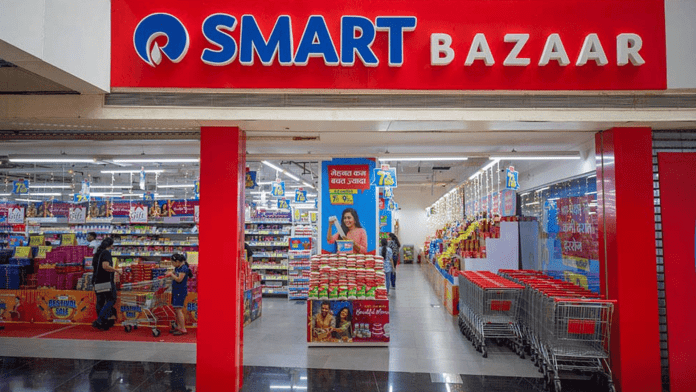Reliance Retail is expanding its Smart Bazaar stores into towns with populations of up to 50,000 to cater to the increasing demand.
According to Damodar Mall, the CEO of Reliance Retail, the most intriguing aspect of consumer growth lies in small towns, often referred to as feeder markets.
“In the Supermarket India that I see – in modern stores or on digital apps – there are no signs of any downward impact on discretionary spending,” he said. “The narrative of some players that non-food is not growing is not a macro consumer concern, but maybe an insight that they are possibly not updating their operating models enough.”
Mall’s statement contradicts the perspectives of certain retailers and analysts who believe that discretionary spending has faced challenges in recent months.
Products in the categories of home, personal care, and general merchandise are all experiencing more rapid growth than our overall store performance. Mall pointed out that feeder markets in smaller towns, like Nokha and Sikar in Rajasthan, Armoor and Banswada in Telangana, and Raygada and Simliguda in Odisha, are displaying strong demand trends.
Reliance Retail, a subsidiary of Reliance Industries, holds the title of the nation’s largest grocery retailer. The company operates stores in a variety of formats, including Smart Superstore, Smart Point, Smart Bazaar, Fresh Signature, Freshpik, and 7-Eleven.
“We are seeing uptrading across categories and FMCG companies facing a slowdown in modern trade may need to do more to grow in tune with the market,” Mall said.
Rural market demand has experienced a slump due to several factors. Analysts report that persistent inflation has adversely affected rural demand, which accounts for over one-third of FMCG sales. Additionally, consumers in these areas continue to exercise caution with their discretionary spending, especially after experiencing irregular rainfall patterns.
Reliance Retail has been actively promoting the sales of its FMCG product range, which includes soft drinks under the Sosyo Hajoori brand, confectioneries by Lotus Chocolates, biscuits from Maliban, Campa Cola, Glimmer beauty soaps, Get Real natural soaps, Puric hygiene soaps, Dozo dishwash bars and liquids, HomeGuard toilet and floor cleaners, as well as Enzo laundry detergent in powder, liquid, and bar formats.
“We do not do private labels, or white labels, as they are conventionally approached,” Mall said. “Our customers buy SnacTac snacks or besan laddoo because they are good things, and most of them may not even know that SnacTac is our brand.”
During the second quarter, Reliance Retail’s grocery segment showed a 33% year-on-year growth, with Smart and Smart Bazaar formats leading the way. The company emphasized that demand remained robust during the festivals in that quarter. In the June quarter of this year, the grocery business had witnessed a year-on-year growth of 59%.
In their earnings reports for the September quarter, prominent FMCG manufacturers like HUL, ITC, and Nestle have voiced their apprehension regarding erratic rainfall patterns, the repercussions on crop yields, and the escalating prices of commodities like wheat, maida, sugar, potatoes, and coffee.
“FMCG companies are learning to think of premiumisation differently for urban, modern trade and rural consumers,” Mall said. “We need more of this to happen.”





